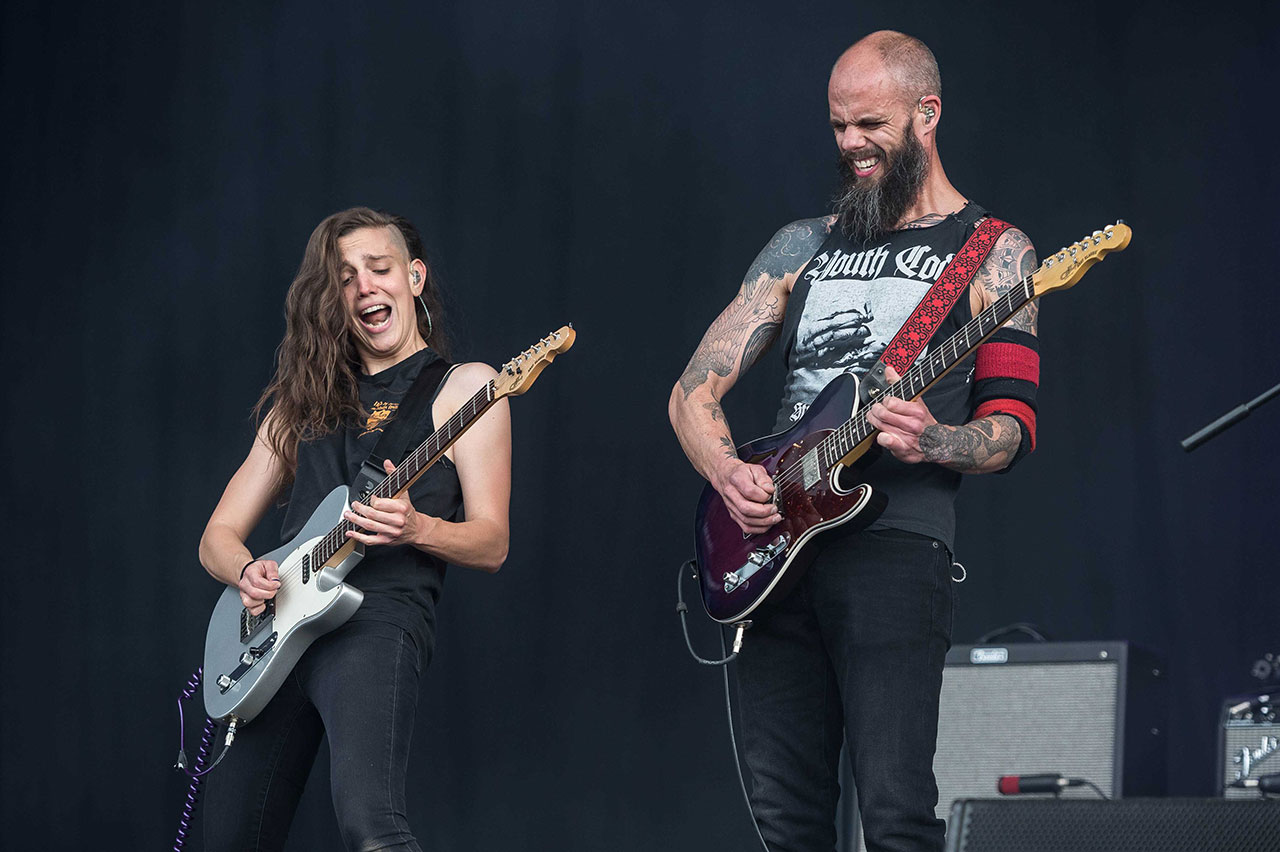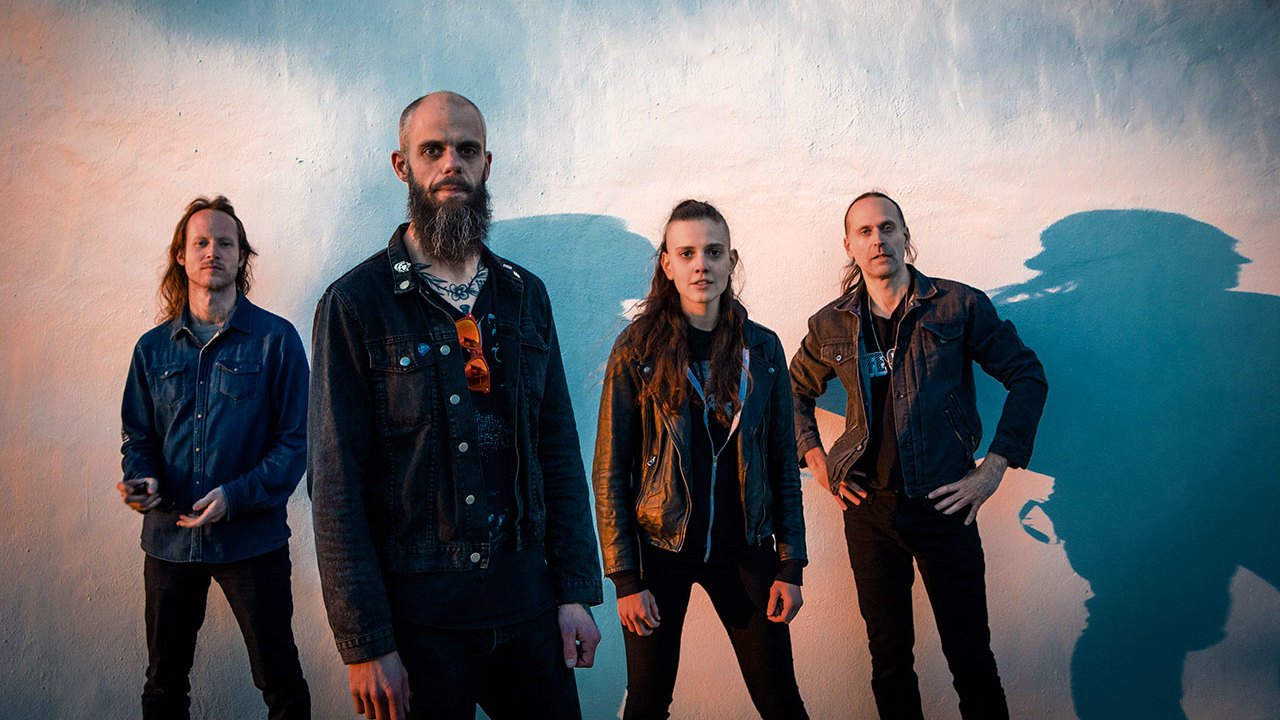Earlier this month it was announced that Baroness guitarist Peter Adams had parted ways with the band. Having been a part of the Savannah sludgelords for nine years and three albums, it came as something of a shock to the metal community. Playing his last show at the John Baizley-curated Roadburn in April, Pete said he decided to step away from Baroness in order to focus on his home life. Enter Gina Gleason. The six-stringed demon has spent her life touring and working with some of the coolest names in rock – Jello Biafra, Doctor Know, Perry Farrell – as well as a long stint working with Cirque du Soleil. Not a bad CV, right?
To find out how Gina was recruited into the ranks of Baroness and the circumstances surrounding Peter’s sudden departure, we caught up with frontman and sole remaining founding member John Baizley. He gives a few hints about the new album, too!
What are the circumstances surrounding Pete’s departure?
“I think it’s important to note that being a touring musician, and being in a band that puts as much effort into the process of touring and writing and rehearsing as we do, it should be noted that it’s not particularly easy if you desire a life at home. If your social life is important, if your personal and private life is important, this lifestyle as a musician can be a great strain. And we’ve had several members for who that strain was exerted in such a way that they did not want it to have a negative effect on their life. So Pete, having been in this band a long time, having been a friend of mine for decades, rather than finding himself in a position where he couldn’t put all of himself and 100 per cent into what it takes to remain in this band, I think he thought that in order to pursue his own interests, a friendly exit from the band would be much better than what could become a dramatic thing. It was really impressive to me, the way that the four of us were able to do this, and for him to leave the band on good terms and with full communication, because it’s so much easier to fuck off and leave. The fact we didn’t do that means a lot to me. I would never want to lose a friend because of this band.”
Who started the conversation?
“He did. We’re all adults, so nobody internally wants to force anybody out. Nobody would be a part of the band if there was that element. This was a decision that he made and talked to us about, and fortunately he was able to leave in a way where we weren’t left high and dry. He decided to leave, and we still had chosen to do this. So he fulfilled his obligations of doing those things, with that 100 per cent involvement. So that when he played his last show, which was at Roadburn last month, it was a good, uplifting and positive experience. Nobody knew that – we kept it very close to the chest. But that was part of it. So he got to leave on very good terms, and with a proper last show. And simultaneously, that allowed us to have time to adjust and find a new guitar player so we were able to continue forward without a huge lag.”
How long do you think he’d been feeling that way for?
“I don’t know, it’s hard to say, because everybody goes up and down on tour. We all have tours that are more of a strain on us, and are not as seemingly fun. You have to learn when that’s just part of the balance of your year, and then when it’s becoming a threat to you personally. I know Pete well enough to know he’s going to voice his opinion when it’s genuine, so I think he did. It didn’t seem like he strung us along, and I don’t think he felt like he was a member of a band too long after he had made that decision personally.”
What was Pete’s role been in the band – how involved was he in songwriting?
“Everyone in the band contributes, so it was never ever the case that he was a sidelined player. Everybody helps write, everybody helps do everything. Clearly there’s a workload differential, it’s impossible to deny that. But we wouldn’t have continued as a band if we didn’t feel like altering that chord of the band would somehow fundamentally change our sound. I was in this band in 2003, I’ve sort of seen it through, and it’s always been really important to me that our other members understand that that’s part of their role – is actually to understand what we’re about. And the way that we write, and the way that we play, and the way that we record is something that sometimes takes a little adjusting.
“What we can’t do is have somebody come in the band without learning a bit about our background. I guess it’s a roundabout way of saying everybody’s critically important when it comes to all of this. I would never hire somebody to show up and record a record and hire them to tour with us while in the background I’m writing everything. But that said, neither is it the case where without his compositional input, we’re incapable of moving forward. I think we’ve found a worthy new guitar player who is going to be fully capable of adding compositionally. And it will be different, but not different by a margin that’s going to change our band, in a negative way.”
How did you feel when he told you he wanted to move on?
“It’s complex, right? Because we have a very longstanding personal relationship, we have a very longstanding professional relationship, we’ve written a lot of music and we’ve gone on a lot of adventures together. So in that regard I think it was heartbreaking for me and it was heartbreaking for him. But because I knew his motivations, and I knew he had something he’d chosen to pursue once his decision was made, I was happy for him. As the singer, or the guy who’s been in the band the longest, it would be fully heartbreaking for me to think that somebody was in this band and didn’t wanna be, and that they felt some undue pressure to appease the other three members, or just to do it for the sake of making a living or something like that. We’ve got to put more into our music than that. So it is complicated. Of course I’m sad to see him go, but I’m also happy to hear he’s got a direction now and focus now that he didn’t have before. So yeah… I guess that’s why it’s complicated.”
- How to curate a music festival, by Baroness' John Baizley
- Read Classic Rock, Metal Hammer & Prog for free with TeamRock+
- Baroness have started writing material for Purple follow-up
- The story behind John Baizley's Jane Doe artwork
You have a new guitarist, Gina Gleason. Why Gina?
“She’s a great player, she’s got an incredible attitude, and she works super hard. And if that’s the case, why not? Being a member of this band is difficult, because it requires a kind of very particular set of circumstances. You have to be a great technical player, but you have to be an emotive player at the same time. There has to be this understanding of finding the balance between that technical playing and just playing hard – which oftentimes means looseness. So it became very clear to me that she could strike that balance. Before she was in the band, when we were just jamming, I sensed the natural chemistry that I have to sense for someone to be in the band. We have to be able to communicate non-verbally. I don’t know how to bark orders at people, nor would I want to if I could. There has to be some level of intuitive response. And so she had that in spades. Most importantly, she’s just a good person. Somebody could check all those other boxes, and if they’re a complete clown or a complete shithead, no fucking way. Because I’ve gotta live with you, we’ve gotta write music, we’ve gotta record, we have to move forward in life, and each step forward we take has to be a positive one. We’re doing things that we consider important, and things that we consider challenging, and challenges that we would like to put out there in the world. So if you’ve got some negativity, it’s going to become markedly different and probably impossible for accomplish the ambitions and goals I have within Baroness.”
What’s your connection with Gina?
“I have a small fuzz pedal company. We just make little stomp boxes for people, and she was one of the first people that bought one. And I noticed on the shipping receipt that she lived two miles from me. I don’t live in a hip neighbourhood, it’s not a place where a lot of people live, it was completely shocking to see that one of these was getting shipped down the road. So one of my partners checked out her Instagram profile, and was like John, you have to see her Instagram. That sounds super lame, but it was so obvious that she was such a talented player. You could kind of see as much as you can, and hear that there was an attitude there that was great, that was enthusiastic and creative and really had this… you could hear it in her playing. She had this real desire to grow. I just hit her up casually, and we started jamming, and that attitude I sensed just seeing her Instagram profile was more prevalent in the rehearsal space than I was anticipating. So it was natural. If it’s natural, and it works, and things seem great, then you just go with it. Because that’s not the majority of life. It’s not the majority of relationships you make. If something feels effortless and you know you’ve got some big work ahead to do, then you should go with that. And that’s in lieu of maybe finding somebody who had a bit more similarity in their history or who had a more developed public profile. I thought the interesting thing about her, and everybody that’s been in the band, is that they come to it with really a fresh attitude, and a huge desire not only to immerse themselves in what we’ve already established, but to push that forward. So, it feels great.”
How far along with the next record are you?
“We started work on it, and I think there’s been a long enough time period in between our last record being released and now, that we are just dying to get new songs out. Every time any one of the four of us sits down, 20 ideas spill out. So this is a period of full flower for us. That’s another thing – when that’s happening, just grab it by the reins and let it pull you. Because if not, then you’re in this unfortunate position where you’re forcing things. And forcing things becomes repetitious, finding patterns that work and systems of organisation that yields predictable results is not what we want to do. We started playing music because we wanted to develop our own rulebook, and change those rules and adapt those rules and evolve and grow when we needed to. So that’s happening now. I can’t say that we’ve got a ton of songs finished, anything ready to hear, but we’ve got so much material to start with, it’s exciting to think about starting to rein this in and make an album out of it.”
How’s it sounding?
“It’s hard to say, I mean there’s so much stuff. I think with Purple we had a very clear idea about what we wanted to do. There was a real focus, because prior to that our bass player and drummer had left, and what we felt happening in rehearsal was that our music was very amped-up, very focused, very direct. That meant that there were certain ideas that have always been part of the Baroness sound that we just… maybe… brushed them aside for the time being. Now I think it’s time to pull some of those elements back in and find some news places to go. Because we’ve been making music for a while; we don’t want to repeat ourselves. We want to keep our sound intact, but we want to develop new ideas that will yield new results and add to our sound, rather than change it.”

What kind of things would you be talking about, for your new sound?
“Sometimes really subtle, theoretic things. New compositional structures, and chord voicings – boring stuff that excites nobody except musicians. But the idea that we can continually open up the level of communication that’s inherent within our music is more subtle and nuanced, but also more bold and genuine, and that we continually put our spotlight on things that are theoretically from a lyrical standpoint maybe difficult. Maybe things that were hard to say five years ago, because there was an emotional weight keeping them from coming out. I’ve found in recent years that the more purely I address that stuff, the better I feel about songwriting. The more our audience seems to respond to it. One thing I’ve learned is that the things that we keep real tight, these emotions and experiences that we don’t want to talk about openly, the more we do address these things, the more we realise our audience has all felt similar things, and because of that, we’re all tied to one another more strongly. So I think that’s something we wanna do. But then it’s like okay, we’ll make the soft songs soft, the hard songs harder, the fast songs faster, the slow songs slower, stuff like that.”
What colour is it going to be?
“We’ll see. We haven’t made up our minds. That’s very specific, and we have not made any decisions on that, as of yet. I don’t want it to be a colour, but, you know, we’ve still got one left…”
Baroness 2017 European tour dates
Jun 19: Esch Sur Alzette Rockhal, Luxembourg
Jun 20: Saarbrucken Garage, Germany
Jun 23: Copenhagen Copenhell, Denmark
Jun 24: Scheessel Hurricane Festival, Germany
Jun 25: Neuhausen Ob Eck Southside Festival, Germany
Jun 27: Graz PPC, Austria
Jun 28: Dresden Beatpol, Germany
Jun 30: Norrkoping Bravalla Festival, Sweden
Jul 02: Helsinki Tuska Open Air Metal Festival, Finland
The 10 best album sleeves according to Baroness' John Baizley

